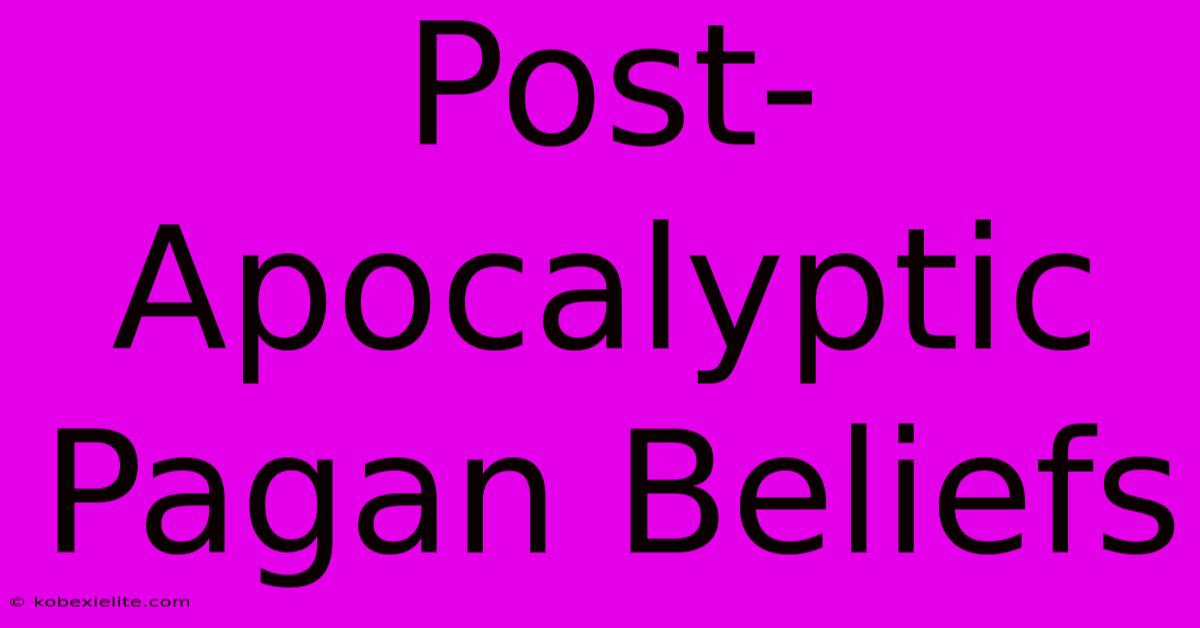Post-Apocalyptic Pagan Beliefs

Discover more detailed and exciting information on our website. Click the link below to start your adventure: Visit Best Website mr.cleine.com. Don't miss out!
Table of Contents
Post-Apocalyptic Pagan Beliefs: Nature Worship in a Broken World
The collapse of civilization, a recurring theme in fiction and a genuine fear in the modern world, often prompts reflection on our relationship with the earth and spirituality. Post-apocalyptic settings, stripped bare of societal structures, frequently see a resurgence of pagan beliefs, adapted and evolved to fit the harsh new reality. This isn't simply a plot device; it's a reflection of humanity's enduring connection to nature and the inherent resilience of spiritual practices.
The Appeal of Nature-Based Spirituality in a Ruined World
In a world ravaged by disaster – be it nuclear war, ecological collapse, or pandemic – traditional institutional religions might crumble alongside societal structures. The centralized authority and established dogma that often accompany these religions might lose their relevance in the face of widespread chaos and suffering. Paganism, with its inherent focus on the natural world and decentralized, community-based practices, provides a potent alternative.
Reconnecting with the Land: Survival and Spirituality Entwined
Post-apocalyptic pagan beliefs often center on a deep, practical connection with the land. Survival hinges on understanding the rhythms of nature – the cycles of planting and harvesting, the behavior of animals, the properties of medicinal plants. This direct interaction fosters a spiritual reverence for the natural world, reinforcing the belief that nature is not merely a resource to be exploited, but a sacred entity worthy of respect and protection. This isn't simply "survival of the fittest"; it's a spiritual imperative.
Adapting Ancient Practices to a New Reality
Existing pagan traditions would likely be adapted and modified to fit the post-apocalyptic landscape. Animism, the belief that spirits inhabit all aspects of nature, might become even more pronounced, with individuals forging deep connections with specific plants, animals, or geographical features that ensure their survival. Ancestor veneration, vital in many pagan traditions, could take on a new meaning, with survivors honoring the wisdom and resilience of those who came before them, ensuring the transmission of crucial knowledge and cultural memory across generations.
The Role of Community and Ritual
Community becomes crucial in a post-apocalyptic setting. Pagan rituals, often centered around the cycles of nature – solstices, equinoxes, harvests – would likely serve not only spiritual purposes but also practical ones, solidifying social bonds and promoting cooperation essential for survival. These gatherings offer a sense of shared purpose, hope, and continuity in a fractured world.
Post-Apocalyptic Paganism in Popular Culture
The resurgence of pagan beliefs in post-apocalyptic narratives is a recurring theme across various media. Consider:
- The emphasis on practical skills: Characters often demonstrate a deep understanding of herbalism, foraging, and other nature-based skills, reflecting the practical application of pagan knowledge.
- The importance of community and ritual: Many post-apocalyptic stories highlight the strengthening of community bonds through shared rituals and ceremonies.
- The reverence for nature: The land itself often becomes a sacred space, prompting characters to respect and protect the natural environment, which represents their lifeline and source of spiritual sustenance.
The Psychological Significance
The appeal of post-apocalyptic paganism goes beyond mere narrative convenience. It taps into deep-seated human needs:
- The need for meaning and purpose: In a chaotic world, pagan beliefs offer a framework for understanding and navigating the hardships of life.
- The need for community and belonging: Pagan practices foster a sense of community and shared purpose, vital for survival and psychological well-being.
- The need for connection with something larger than oneself: Nature's enduring power and cyclical nature provide a sense of continuity and hope, even in the face of devastation.
Post-apocalyptic pagan beliefs, therefore, aren't simply a fictional construct; they represent a potential response to societal collapse and a reflection of the enduring human need for spiritual meaning and connection with the natural world. The themes explored in post-apocalyptic fiction highlight the resilience of nature-based spirituality and its capacity to adapt and thrive even in the most challenging circumstances. It underscores the importance of our relationship with the environment and the potential for spiritual renewal in the face of adversity.

Thank you for visiting our website wich cover about Post-Apocalyptic Pagan Beliefs. We hope the information provided has been useful to you. Feel free to contact us if you have any questions or need further assistance. See you next time and dont miss to bookmark.
Featured Posts
-
Madrid Dominates Salzburg 5 1 Ucl
Jan 23, 2025
-
Oilers End Capitals Winning Streak
Jan 23, 2025
-
Jewelry Designer Lynn Ban Fatally Injured Skiing
Jan 23, 2025
-
Ski Accident Claims Lynn Bans Life
Jan 23, 2025
-
De Minaur Rejects Zero Belief Claim
Jan 23, 2025
